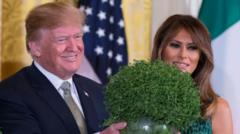Every March, the tradition of Irish politicians visiting Washington, D.C. for St Patrick's Day events sparks discussions about its significance in strengthening economic and political ties with the United States. Politicians and business figures from both the Republic of Ireland and Northern Ireland gather, yet this year, some Northern Ireland politicians are choosing to abstain due to issues surrounding Donald Trump's administration.
These annual visits are seen as crucial for fostering US investment and enhancing business relationships. Steve Aiken, who has participated in these events as a representative of the British-Irish Chamber of Commerce and as leader of the Ulster Unionist Party, insists that face-to-face interactions are imperative for meaningful engagement. He emphasized that without personal communication, establishing beneficial relationships becomes a challenge.
Máirtín Ó Muilleoir, a former Sinn Féin politician, has experienced both the advantages of participation and the missed opportunities of absence. He highlighted that St Patrick's Day presents an ideal environment for Irish interests to resonate in the U.S., as many major companies engage in promotional activities for the occasion. He anticipates a significant financial announcement related to Belfast could emerge around this time.
The ceremonial act of presenting a bowl of shamrock to the U.S. president, a tradition that dates back to 1952, symbolizes the ongoing diplomatic relationship between Ireland and the United States. However, the direct impacts of these trips are often challenging to quantify. Northern Ireland's economic improvements in U.S. investments are notable, yet experts like Esmond Birnie caution that tangible outcomes from these visits can be elusive.
With fewer Irish-Americans holding prominent positions in Congress, maintaining geopolitical interest amid myriad global issues presents a challenge for Irish representatives. Nonetheless, Ó Muilleoir remains optimistic about Ireland's standing in America.
This year’s events face controversy, as Sinn Féin and other parties boycott due to disagreements with Trump’s policies. However, some, like Deputy First Minister Emma Little-Pengelly from the Democratic Unionist Party, argue that it is essential to continue fostering relations with the U.S. The debate raises questions about the moral implications of participation in politically charged times, challenging Irish politicians to navigate the complexities of diplomacy and representation.























